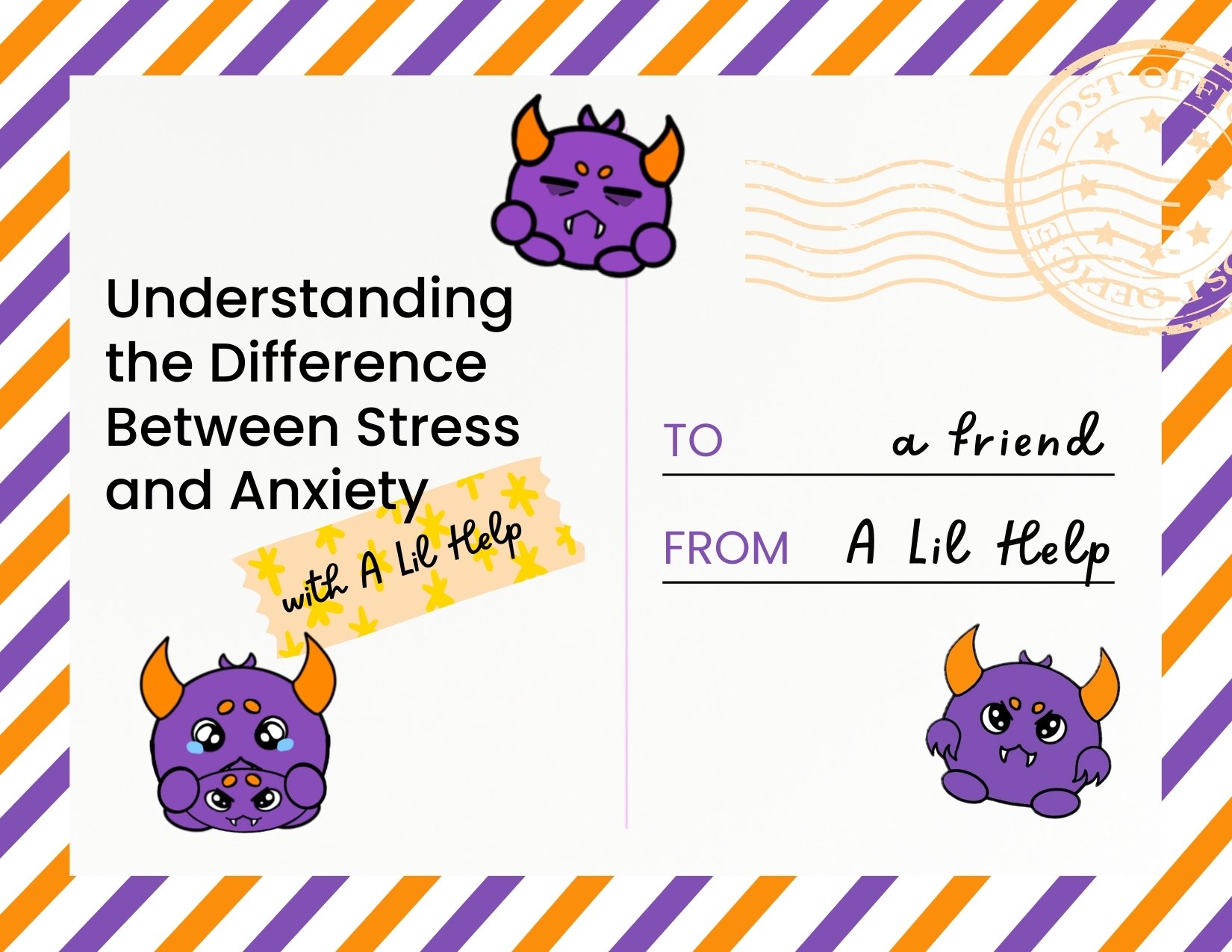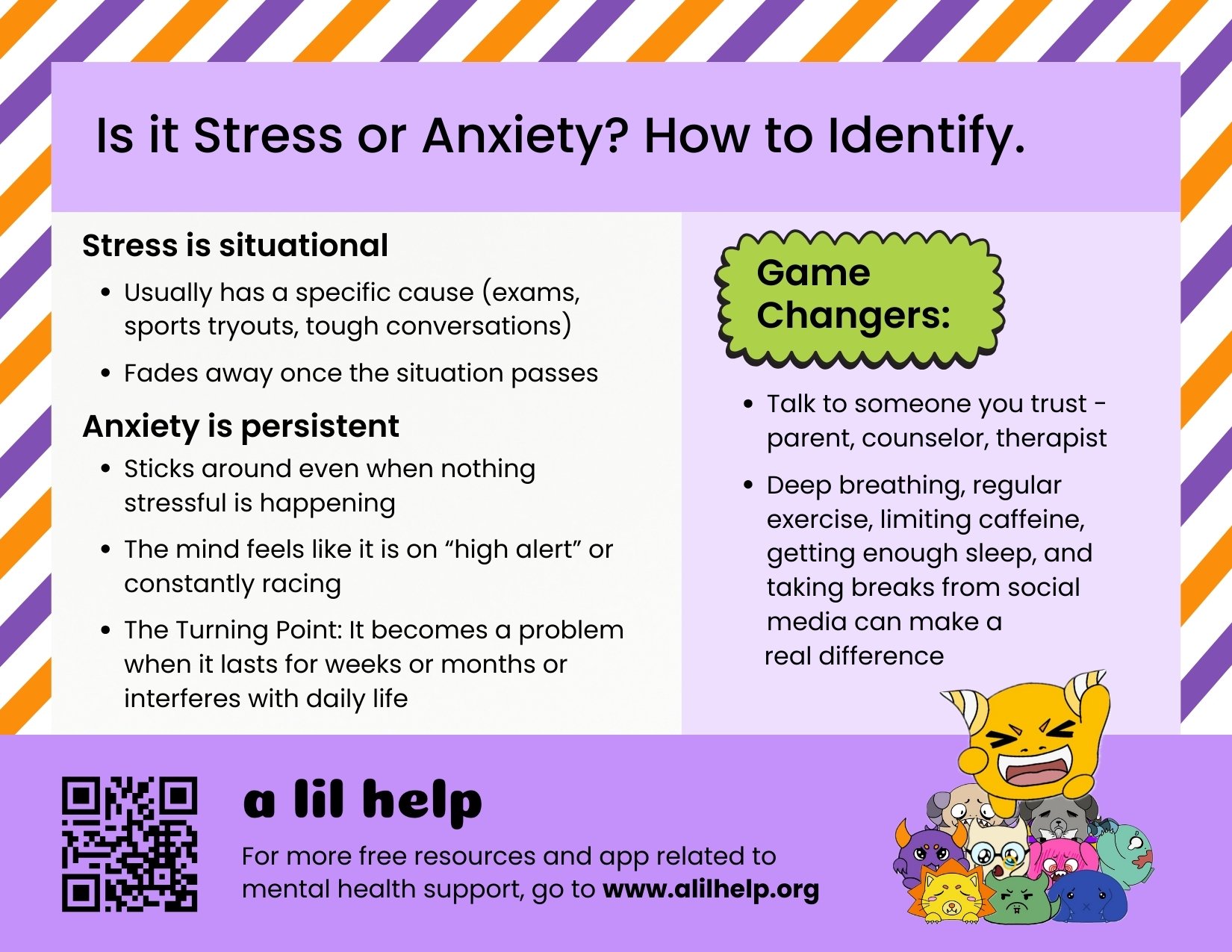

Remember
Having anxiety is completely natural. It just matters on how you express that anxiety and cope with it.
What is Anxiety?
Understanding the Difference Between Everyday Stress and Something More
Written by Stella W.
Picture this: You’re waiting for your name to be called before a big test or a sports tryout. Your stomach feels tight, your thoughts are speeding, and your hands are a little shaky. That feeling? That’s anxiety. But here’s the main point - feeling anxious sometimes is totally normal. Everyone feels worried or stressed when something important is about to happen. Anxiety becomes a problem only when those feelings don’t go away, show up for no clear reason, or start getting in the way of your everyday life.
What is Going On Here?
Let's break down the vocab real quick:
💜 Stress vs. Anxiety: Stress and anxiousness usually has a specific cause such as an upcoming exam, a tough conversation, a performance. Once the situation passes, the stress usually fades.
💜 Anxiety, on the other hand, is a mental health condition and can stick around even when nothing stressful is happening. It can feel like your mind is constantly racing, your body is on “high alert,” or you can’t stop worrying no matter how hard you try.
💜 When worry becomes so intense that it interferes with your daily life, lasts for weeks or months, or makes you avoid things you need or want to do, that's when stress crosses into anxiety.
💜 Some people even experience panic attacks, which can feel like sudden waves of fear, a pounding heart, dizziness, or trouble breathing. These moments are scary, but they’re treatable and temporary.
💜 Anxiety vs. Depression: Anxiety and depression often go hand-in-hand, but they're not the same thing. Anxiety is usually about fear and worry where your mind races forward to all the bad things that might happen. Depression is more about feeling empty, hopeless, or numb, like nothing will ever get better.
💜 With anxiety, you might avoid a party because you're worried people will judge you; with depression, you might not go because you can't find the energy or don't see the point. Many people experience both, and that's okay but it’s important to understand both.
Why does this happen?
Anxiety shows up in different ways for different people, but some common signs include:
✔️ racing thoughts that won't stop
✔️ constant worrying about things that might go wrong and overthinking
✔️ avoiding school or social situations
✔️ feeling restless or on edge
✔️ trouble concentrating
✔️ difficulty sleeping.
✔️ rapid heartbeat, sweating, shaking, or feeling like you can't catch your breath
✔️ panic attacks, which are sudden, intense waves of fear that might come with chest pain, dizziness, hot or cold flashes and an urge to escape
It can be caused by many things such as pressure at school, family stress, social media, big life changes, or even how your brain and body react to stress. And it’s different for everyone. What matters most is noticing patterns: Is the anxiety temporary… or does it feel like it’s taking over?
Myth Buster Alert
✖️Myth: Everyone gets anxious for no reason.
✔️Fact: While stress is common, anxiety has triggers and patterns, even if they can be hard to spot. More importantly, anxiety can be managed.
How to Deal
So what helps? Start by talking to someone you trust such as a parent, school counselor, or therapist. Simple strategies like deep breathing, regular exercise, limiting caffeine, getting enough sleep, and taking breaks from social media can make a real difference. Learning to challenge anxious thoughts and gradually facing fears instead of avoiding them are skills that therapists can teach you. If anxiety is significantly impacting your life, professional help (whether therapy, medication, or both) can be a game-changer.
The Bottom Line
Recognizing that what you're experiencing might be anxiety, and not just stress, is the first step toward feeling better. Anxiety is real, but it’s also treatable. Talking to someone you trust, practicing calming strategies, and asking for help when you need it can make a huge difference.
DISCLAIMER: This article is for informational and educational purposes only, from publicly available information. It is not medical or professional advice. If you’re struggling, talk to a trusted adult, counselor, or healthcare professional.
